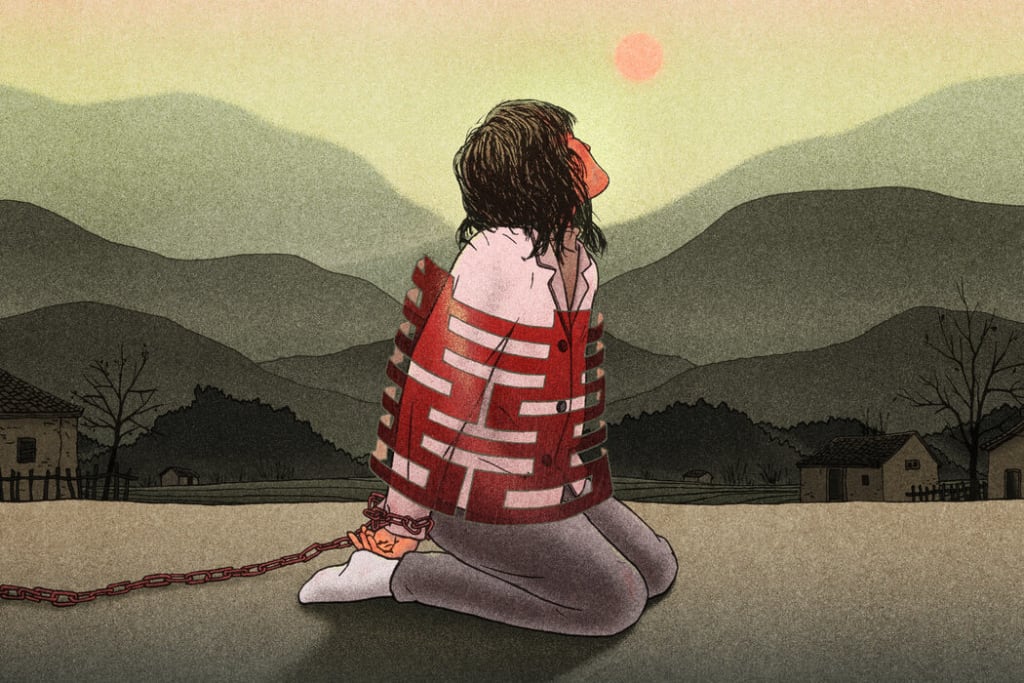An in-depth analysis of Women trafficking in China
Wish no trafficking in the world

As the case of the chain girl in Fengxian County, Xuzhou, caused a continuing public outcry about the trafficking of women, Yao first recalled the experience through a Youtube video platform in mid-February.
An unsuccessful rescue
"She hid in a pile of firewood and held her blind son in her arms. She didn't say anything to her. She was numb," Yao recalled.
Deng Lulong's answers to the rescuers' questions were alternately clear and vague. They judged Deng to be mildly mentally retarded, Yao said.
Our correspondent has been able to verify some of Deng's information from the New York-based group Women's Rights in China. Deng Lulong lives in Liulin Township, Susong County, Anhui Province, because it is more than a child, was abandoned by his father, 13 years old by the village village teacher rape, 14 years old by uncle sold to a nearby North Bath township more than 40 years old man.
"Deng Lulong's husband should not be called husband, because he is not married, let her meet clients in the village, the village from 60 to 30 years old, and younger men who cannot find a wife to sleep with her, 20 yuan a time," Yao Cheng said, adding that the man used her prostitution money to build a small house.
The Chinese Women's Rights team visited Deng and did not see her until the third time because she was not at home much of the time. "People in the village said she couldn't stand it, couldn't stand being abused by so many men, and she ran away, often," Yao said. She went into the mountains, slept in a haystack and ate crops in the fields, typical of a modern white-haired girl."
But Ms. Deng went back anyway, Ms. Yao said, to see her infant son, who had become blind because of an eye infection.
Yao Cheng and his companions rescued Deng Lulong this action did not succeed. When Yao Cheng was still in the woodshed asking Deng Lulong, he had felt the impending danger, "we found it very dangerous, surrounded by a lot of people, carrying a pole and hoe, what does that mean? Because they know that we want to get this out, and if this gets out, these men are committing a crime."
After the team was forced to leave, they went to the local police station to report the case, but the police station was "private", unwilling to intervene. Now, 11 years later, Zhang Jing, founder of China Women's Rights, tweeted on February 24 that Deng is still "suffering" because of the local police's inaction.
All the dark corners
Zhang Jing's group, Women's Rights in China, is often seen as a rescuer to the families of abducted victims, but she told SciDev.Net that she often breaks down when confronted with individual cases of abducted women. "Sometimes when we can't save people, we just look at...... Like Deng Lulong's case, we found her, helped her report to the police, have done so much, but still can not save her.
China Women's Rights set up the China Women and Children Protection Center in 2007 to rescue abducted women and children. Yao, who also joined the work that year, said that from the very beginning, participants agreed to join as volunteers and put up their own time and money.
Yao told SciDev.Net that he was mainly responsible for rescuing abducted children, most of whom were girls. "These children, like the Feng County chain girls, were abducted as children, and later when they grow up, they need to find relatives. So when we look for children, more than half of what we find are women, women who have settled down and had children."
According to the relevant cases published by Chinese courts over the years, women are trafficked in a variety of ways, including violent robbery, drugging, seduction and so on, which are generally carried out against the will of the victims. Out of concern for the widespread phenomenon of women trafficking, some Internet users rascally joked that there is only a stick of distance between you and the chain girl.
Yao Cheng analyzed that girls are used for many more purposes than boys after being trafficked. "If you buy a girl, you can raise her at home to be a labor force, and then you can raise her to be a daughter-in-law. It saves money. There are also traffickers who see the economic value of girls and send them to entertainment places, all kinds of things."
Yao's statement actually points to the main outlets for trafficked women and girls, including forced marriage, forced labor and so-called entertainment venues. There are also a few places, including Shanxi, Hunan and other places, have been reported to have abducted women sold bodies for Yin marriage. And entertainment venues mostly refer to the actual porn industry.
Chinese AIDS rights activist Wan Yanhai promoted health safety measures among China's sex workers while working in the Chinese government's health ministry in the 1990s. In actual work, he observed that there are a number of female sex workers is likely to be abducted, "a lot of young girls is to be home for the elder sister of so-called successful out of, in the city found that turned out to be to do this, some people will always resist, some people will be forced, but some people may accept, these are pretty much."
Wan Yanhai confessed to this station, because mainly engaged in health and safety work, even if found to have been trafficked, it is not convenient to report to the police, because this can not get the trust of the entertainment owners, the work can not continue.
"More than three million abducted children, mostly girls"
Accurate data on the number of trafficked women, both adults and underage girls, are hard to come by across China. In an article published in 2018 in the Journal of Historical Archaeology & Anthropological Sciences, From 2000 to 2013, a total of 92,851 young women and children were trafficked in China, according to statistics compiled by international organizations. But she stressed that the actual number of trafficked people could be much higher.
Based on his years of experience in rescuing abducted children, Yao gave an estimate: "From 1980 to 2016, when the second child policy was allowed, 200,000 children were abducted a year at its peak. According to our own statistics, 100,000 children are abducted every year, 100,000 a year, 1 million a year, and more than 3 million over 30 years."
Yao Cheng mentioned earlier that most of the abducted children are girls, which is also in line with the general law of the world. A 2016 report by the United Nations Office on Drugs and Crime said 96 percent of abductions in 71 countries for which data were available in 2014 were women.
In practice, many abduction victims are hard to identify and thus hard to count. "Many of the children cannot be found because they have been whitewashed," Yao said. "The families who bought the children have paid some money to the police officers in the police station to register them, and then they cannot be found. He said it was his family, he had a hukou, he made up a date of birth, a name and so on. You can't find it."
The true identity of the chain girl in Xuzhou, Jiangsu province, remains a mystery. Although the fifth circular issued by the Jiangsu provincial government confirmed that she is Yang Xiaxia, also known as Xiaomei from Yunnan province, in the wedding registration photo, there are still widespread doubts on the Internet about her true identity.
At the same time, the Chinese government appears to be extremely secretive about its statistics on human trafficking. This is the fourth year in a row that the Chinese government has not released any data on victims of human trafficking, which may be related to the government's practice of forced labor in some areas and mass detentions of ethnic minorities, including Uighurs, the U.S. State Department said in a 2021 report.
A kidnapped woman who can't get away
The outflow and inflow of abducted women have a general pattern in the geographical distribution. Ms. Zheng of the State University of New York noted in the previous article that sales were concentrated in the provinces of Anhui, Guizhou, Henan, Sichuan and Yunnan, while purchases were made in relatively backward rural areas in Jiangsu, Zhejiang, Shandong, Henan and Inner Mongolia.
Abducted women are sold by traffickers like commodities. Jiangji Village in Xuzhou, not far from where the chain woman was killed, was the largest "population wholesale market" in northern Jiangsu as early as 2000, according to the Procuratorial Daily, a state-run newspaper.
The current price of these women in the "market" has been very different from the past. Yao pointed out that before the mid-1990s, there was a huge difference between the price of boys and girls. "In the mid-1980s, boys were paying more than 10,000 yuan and girls 1,000 yuan; But after 1995, '96, it was 20, 30, 000."
Ms. Zheng's 2018 study found that the price of buying and selling an abducted woman ranged from 6,000 yuan to 40,000 yuan.
A large number of trafficked women are abused, raped or sexually enslaved. They are often stuck in these situations for ten or twenty years, unable to escape.
Referring to the case of a woman from her village who was abducted to Anhui and tortured to death by the buyer, Dong Ru (who asked not to be named), said: "When I went to see her mother-in-law, I scolded her, and I asked my friends to see her. My friend told me she was a wreck, beaten to the point of insanity by her family, who starved her to death."
Zhang Jing told the BBC that if abducted women are abused and imprisoned for years, there is a high probability that they will become mentally disturbed. "This person is always nervous and angry. They have no one to talk to for years, they live alone, they suffer physical and emotional trauma and abuse, so they have to be mad."
In some cases, abducted women are imprisoned by buyers, resulting in abnormal dependence. At the time, Ms. Zhang said, her team was evaluating the possibility that Ms. Deng, mentioned in the beginning of this article, might have Stockholm syndrome and could not live without the "family."
"People who have been abused for a long time, when they feel that it has become a habit, a part of their life, they may not realize that it is abuse, but they take it for granted. Then, one day, give her a little kindness, give her a dress, give her a little food, she will be grateful."
Then there are those who will fight it all the way. The protagonist of Blind Mountain, a 2007 film based on real people about the fate of abducted women, is Bai Xuemei, a female college student who is abducted and sold to a mountainous area. Years later, when her father and the police find her and try to rescue her, villagers obstruct her. Bai Xuemei is in a hurry, one knife cut to so-called "husband". Such artistic figures are not difficult to find more similar cases in reality.
Other abducted women choose to return to their families after being rescued. Both Mr. Yao and Ms. Zhang mentioned Xiao Guangyan, a woman from Guizhou province whom they rescued in Fujian province in 2009. Xiao Guangyan, who was abducted and turned into a child bride at the age of seven, finally found her family of origin after 25 years, but later returned to her husband's family in Fujian province. There were several similar cases in Fujian.
"Because they think it's good to have grown up here," explained Zhang. There are suffering everywhere, and they are good to us sometimes."
The paradox is that hell is not necessarily what happens to abducted women when they are involuntarily dragged into a fork in their fate that they did not expect.
Famous Chinese debater, Harvard University, doctor of law ZhanQingYun recently in network blog "unacceptable" interview, she has a table was young my aunt abducted to jiangsu rural, but a tracing back home after 20 years of guizhou, but she is like visiting relatives come back, she satisfied with abducted and later life, because life is better than in guizhou, jiangsu The paid family was good to her, too.
The permissive power of the defeated countryside
In a variety of uncovered cases of trafficking in women, the countryside often presents the face of numbness and indifference. A long chain around the neck of Xuzhou, Jiangsu, the chain woman for so many years, a large iron cage closed in Shaanxi, Jia County, the iron cage woman for so many years, the surrounding villagers seem to ignore.
Villagers are sometimes even accomplices. In Yao Cheng wants to rescue Deng Lulong, surrounded by dozens of local men who want to pounce at any time, do not let people take her away.
In such villages, there seems to be no rule of law, the police do not enforce the law, and the public power of the state is completely absent in the face of the complaints and appeals of these trafficked women. In an article published in early February, Guo Yuhua, a sociology professor at Tsinghua University, repeated an assertion she made in a 2007 analysis of the black brick kiln slave labor incident in Shanxi Province: The ecology of the underclass, which is left unchecked and abandoned by power and governance, rapidly deteriorates.
A senior Chinese police officer who has been involved in the crackdown on trafficking told BBC on the condition of anonymity that the local public security authorities had seriously failed in their duty in the case of the chain girl. "First of all, the local police were able to detect [such incidents], because the Ministry of Public Security had a village system, and every village had a police station. An ordinary township is in charge of a dozen or twenty villages, or as many as thirty. How could it not be discovered?"
'It's not just the police who failed in their duties, but also the leaders of the grassroots government and village committees,' he said. 'But the public security organs should take the primary responsibility.' But he also stressed that grassroots police stations in rural areas are severely understaffed and under great pressure. "There are a thousand lines above and a needle below, and all the work is at the grassroots level, which is all kinds of work. It says that grassroots police are not allowed to participate in non-police activities, but in fact there are too many non-police activities of grassroots public security organs. In recent years, the pressure of petition stability and control is too great."
The police officer further analyzed that the important thing is that the fight against trafficking is not included in the evaluation system of police officers. "The fight against trafficking is not evaluated. The key content of the evaluation is not to fight against trafficking. They don't pay attention, we are busy with our work, and the police are very few. Who cares about this kind of thing?"
Dong Ru, a trafficked woman from Anhui province, told the BBC that when she was beaten by her husband, she found it useless to call the police. "Especially like my husband, his brother is capable and has good relations with village officials. Even if I go to the police station, I can't beat him. The other is the government, which you do not understand, which is useless, and the police, which is unreasonable, will not take the side of a stranger."
On the other hand, the handling of trafficking cases by judicial organs is also subject to local protectionism. Neal said, once they find the location of the abducted children, only to find the police station to rescue, because they don't have the executive, but police station most unwilling to contribute, "let's go to the village to save a child is very dangerous, is often play out, because they have spent money to buy a child, you go get his children and he will tell you desperately. So it is up to the government to rescue them, but most of the time, the government has local protectionism.
Che Hao, a professor of criminal law at Peking University, wrote in early February in the China Law Review, an academic journal, that "it can only be a beautiful ideal to expect investigators who live historically and culturally in the same region to come down hard on farmers who buy wives with the need to be ruthless."
He emphasized that the buyer may be a member of a social network of local acquaintances, and that investigators do not have a strong justice incentive to find the buyer guilty of rape, detention and other felonies, which are often treated with a light sentence for bribery, and often with a suspended sentence.
A trafficking profit chain in the government
But the public powers that are supposed to look out for those at the bottom do not just seem to abandon those at the bottom. In the process of rescuing abducted women and children for many years, Yao Cheng and Zhang Jing found that local government departments not only failed to crack down on trafficking, but also failed to support the rescue of victims, and sometimes even blocked the rescue of victims.
Chinese Women's Rights groups sometimes travel to different places to promote their efforts to help abducted people, but are often harassed and suppressed by the local government.





Comments
There are no comments for this story
Be the first to respond and start the conversation.